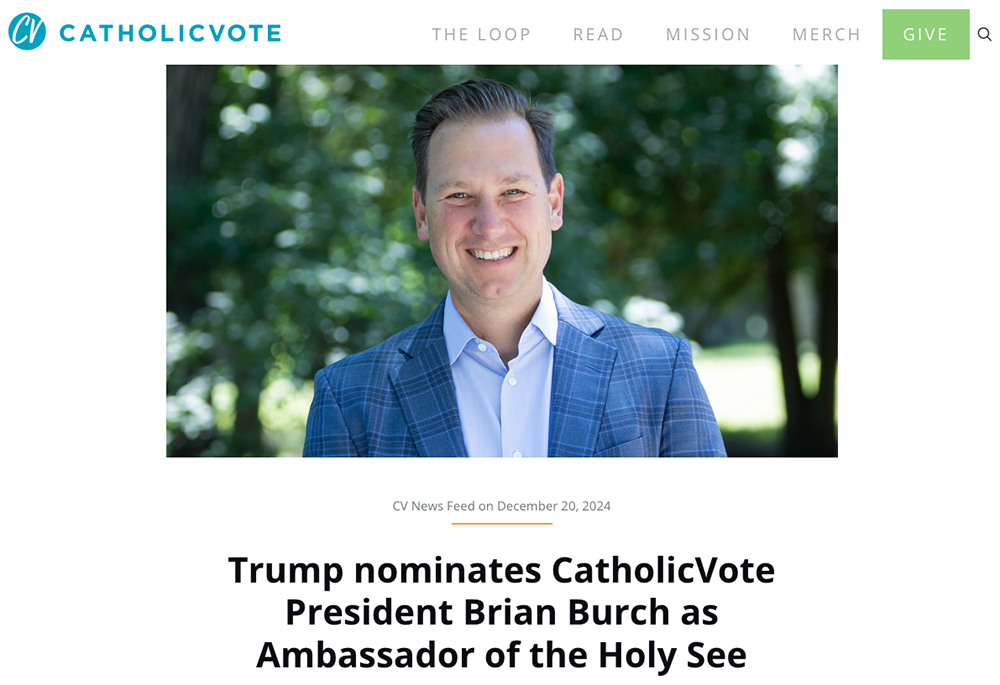
Republican President-elect Donald Trump gestures while addressing supporters during his rally at the Palm Beach County Convention Center Nov. 6 in West Palm Beach, Florida, after being elected the 47th president of the United States. (OSV News/Reuters/Carlos Barria)
U.S. President-elect Donald Trump has nominated a sharp papal critic to serve as his next representative to the Vatican.
The incoming president announced on Dec. 20 that he would nominate Brian Burch, president of the political advocacy group CatholicVote.org, as his next ambassador to the Holy See. Burch's nomination will now require U.S. Senate confirmation and agreement from the Holy See before he can officially take up his post.
"He represented me well during the last Election, having garnered more Catholic votes than any Presidential Candidate in History!" wrote Trump in a statement. "Brian loves his Church and the United States - He will make us all proud."
Trump's choice of Burch to represent him here in Rome is certain to raise eyebrows inside the Vatican, as he has long expressed criticism of the Francis papacy.
Following Francis' 2023 decision to allow priests to bless individuals in same-sex unions, Burch blasted the pope for creating "confusion" within the Catholic Church. He went on to predict that the now 88-year-old pontiff would not be in office much longer and that the next pope must "clarify" the confusion of the Francis era.
On other occasions, he has criticized Francis' governance for what he characterized as a "pattern of vindictiveness."
Advertisement
"Burch is an agitator, mostly, the opposite of a diplomat," said Steven Millies, a public theology professor and director of the Bernardin Center at Catholic Theological Union in Chicago.
"In this way, I suppose while Burch will be a good representative of this second Trump Administration, his appointment signals what we already know; a difficult time lies ahead for U.S.-Vatican relations," Millies told National Catholic Reporter.
That Trump chose Burch, a partisan political operative, instead of a Catholic academic or seasoned politician to represent the United States at the Holy See is "very telling," said Massimo Faggioli, a theologian and church historian at Villanova University.
"This is an operative who has been really a campaigner in the trenches for Donald Trump, so I think this appointment says something about the kind of relationship that Donald Trump wants to create with the Vatican," Faggioli told NCR.

This screen grab of the CatholicVote.org homepage on Dec. 20 features the announcement of President-elect Donald Trump's nomination of Brian Burch as his next ambassador to the Holy See. (NCR screen grab)
Burch's CatholicVote.org group has been a longtime supporter of Trump, endorsing him early on in the 2024 Republican primary for president. But his advocacy on behalf of the president marks a noticeable pivot from when, in 2016, he signed a manifesto declaring Trump to be "manifestly unfit to be president of the United States."
In a statement on social media, Burch said he was honored to take up the new role.
"I am committed to working with leaders inside the Vatican and the new Administration to promote the dignity of all people and the common good," he wrote. "I look forward to the confirmation process and the opportunity to continue to serve my country and the Church. To God be the glory."
During his first term in office, from 2017-2020, Trump was represented by Callista Gingrich as his ambassador to the Holy See. Faggioli said Gingrich adopted an institutional style that served her well as an ambassador.
"She understood that being an ambassador requires a certain kind of style and ethos," Faggioli said. "I'm not sure if that will happen this time. It remains to be seen if [Burch] adopts an institutional style or he will bring an activist’s energy to the United States embassy."
In 2008, Burch, a married father of nine children, cofounded CatholicVote as a nonprofit with a mission statement to "inspire every Catholic in America to live out the truths of our faith in public life."
Burch is a regular guest on conservative media outlets such as Fox News, Newsmax and BlazeTV.
Under Burch's leadership, CatholicVote has at times courted controversy. In 2020, the nonprofit harvested the cellphone data of churchgoing Catholics and evangelicals in a failed effort to reelect Trump.
In 2022, CatholicVote suggested that Catholic agencies assisting undocumented migrants were contributing to the "chaos" at the U.S.-Mexico border. The nonprofit sued the Biden administration for communications records between federal agencies and Catholic nonprofits in southern Texas.
"American Catholics deserve to know the full extent of the U.S. government's role in funding and coordinating with Catholic church affiliated agencies at the border, and what role these agencies played in the record surge of illegal immigrants over the past year," Burch said in a separate prepared statement that year.
CatholicVote's lawsuit drew sharp responses from Catholic observers, including Bishop Daniel Flores of Brownsville, Texas, who accused CatholicVote of framing the relationship between Catholic humanitarian agencies and the federal government "in a distorted way."
More recently, CatholicVote in September launched an ad campaign in several contested battleground states that accused Vice President Kamala Harris of supporting taxpayer-funded gender reassignment surgeries on children. LGBTQ advocates accused the nonprofit of using misleading and inflammatory terms for partisan political purposes.
On the social media platform X, CatholicVote described Burch’s nomination as “a testament to the importance of Catholics to the United States.” The nonprofit also credited Burch with launching "influential campaigns exposing violence against Catholic churches and uncovering government overreach targeting Catholics and pro-life advocates."
The National Catholic Reporter's Rome Bureau is made possible in part by the generosity of Joan and Bob McGrath.
This breaking news story has been updated.







